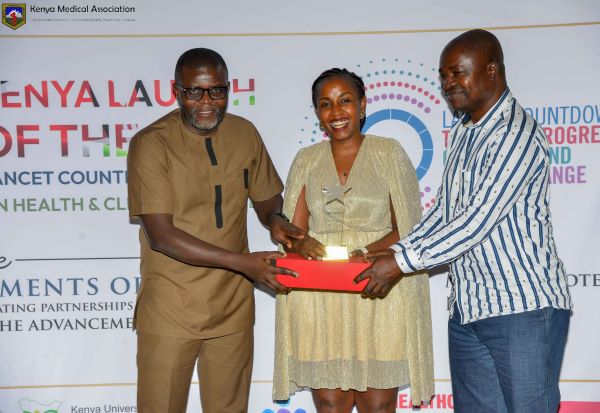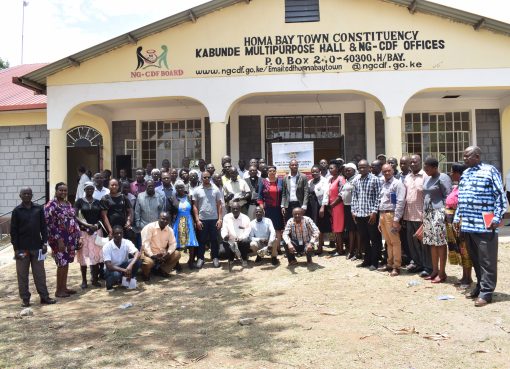Medics have exuded confidence in research, innovation and outreach efforts undertaken by the Kenya University Biotechnology Consortium (KUBICO) to addresses critical global challenges facing farmers towards mitigating the vagaries of global warming in the agricultural sector.
The doctors under the Kenya Medical Association (KMA) lauded the biotech experts for their research in developing climate resilient crops and animals to cushion farmers against the ravages of climate change that occasioned loss of production due to the global phenomena.
The commendations comes after the experts recently engaged the medics and the general public on sensitization sessions on the latest innovation in the field biotechnology and biosafety to clear the misconceptions that shrouded the use of Genetic Modified Organism (GMO) in the country.
The Doctors who had since been put to speed on related processes in genetic engineering, safety assurance and regulatory safeguards acknowledged the research milestones during the launch of the 2024 Lancet Countdown Report.

KUBICO Secretary General Joel Ochieng said training and partnership with KMA has enabled several Doctors to discuss biotechnology and GMO from an informed perspective, and assured the Medics of continued capacity development through the various KMA Committees.
“We are aware that a policy position on the safety and benefits of genetic engineering and its products require a wider consultation and participation of other stakeholders within the healthcare fraternity. We will continue to work with the various Committees of KMA to enhance the participation of other stakeholders within the healthcare system”, said Dr. Ochieng, a Senior Researcher and Leader of the Agricultural Biotechnology Programme at the University of Nairobi.
KUBICO was awarded a trophy by KMA for outstanding partnership and public education on GMO.
Chief Executive Officer (CEO) of KMA, DR. Brenda Obondo challenged the partners to increase support and commitment to enable KMA meet its objectives of incorporating climate change mitigations within their operations and increasing knowledge of healthcare workers on climate change.
This comes at a time when the National Biosafety Authority (NBA) has called for public participation on the environmental release of another locally developed variety of Bt maize (a GMO) with protection against fall army warm as well as stem borer.
The partnership between the biotech experts and the Doctors is expected to tilt the scales.
Prof. Richard Oduor, the Registrar for Research at Kenyatta University and Chair the Council of the Consortium, exuded confidence that most Doctors now have a better understanding on GMO development process, and will be able to support such scientific progress.
He explained that for the last 20 years the Kenyatta University has been making genetically modified foods but when people talk about genome they still shy away including the medics who do not come out very strongly
“The Trust that the masses have with Medics is what is needed and that through collaboration with the two institutions, they can break the barrier and bring the science that is thought to be a little technical and make it very basic to be understood”, Prof. Oduor who is also the KUBICO chairman said .
Prof. Lukoye Atwoli from the Aga Khan University said they have been running programs and supporting research initiatives and collaboration with partners such as the Biotechnology consortium which is doing admirable work in research focused on food security through biotechnology.
“KMA has demonstrated that addressing climate change is not just about advocacy it is about action”, he said adding that the approach goes along a programme where the government is putting up a global transformation agenda by prioritizing public health, resilience, and sustainability.
Prof. Lukoye noted there are only limited countries that have caused the most damage to the environment that is causing climate change and thus it is our responsibility to keep reminding them every time we stand up that they have to pay for it and they have to invest in mitigating climate change.

In November this year, the High court dismissal several petitions challenging the lifting of the ban on genetically modified organisms (GMO). This was after the cabinet decision in 2022 to lift the ten year ban on GMO, attracting several litigations amid fears that such foodstuffs could be harmful to both human and animals.
The petitioners, through Applicant Paul Mwangi, have moved to the Court of Appeal challenging the ruling of Judge Lawrence Mugambi, in which they list the Attorney General, Kenya University Biotechnology Consortium, and Biodiversity and Biosafety Association of Kenya.
During the Lancet Countdown 2024 Report on Health and Climate Change launched yesterday one of the point tracks the relationship between health and climate change highlighting the increasing exposure to extreme heat and health risks
The economic impact of heat has seen labour productivity declining and in 2023, Kenya lost 956 million labour hours due to the heat exposure, while agriculture workers suffered the most accounting for 83 percent of lost hours and 59.9 percent of income losses
The report calls for adapting health systems to address climate change impacts, redirect investment from fossil fuels to health systems strengthening and to also accelerate transition to renewable energy for health and environmental co-benefits.
By Wangari Ndirangu





